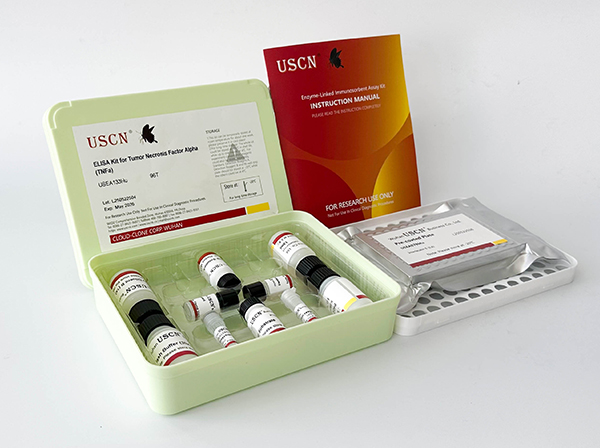CLIA Kit for Cathepsin K (CTSK)
CTS-K; CTS02; CTSO; CTSO1; CTSO2; PKND; PYCD; Pycnodysostosis; Cathepsin O; Cathepsin X
- Product No.USCA267Mu
- Organism SpeciesMus musculus (Mouse) Same name, Different species.
- Test MethodDouble-antibody Sandwich
- Assay Length2h, 40min
- Detection Range5.49-4,000pg/mL
- SensitivityThe minimum detectable dose of this kit is typically less than 1.94pg/mL.
- Sample Typeserum, plasma, tissue homogenates, cell lysates, cell culture supernates and other biological fluids
- Download Instruction Manual
- UOM 48T96T 96T*5 96T*10 96T*100
-
FOB
US$ 272
For more details, please contact local distributors!US$ 389
For more details, please contact local distributors! US$ 1751
For more details, please contact local distributors! US$ 3307
For more details, please contact local distributors! US$ 27230
For more details, please contact local distributors!
Specificity of the CLIA Kit for Cathepsin K (CTSK)
This assay has high sensitivity and excellent specificity for detection of Cathepsin K (CTSK).
No significant cross-reactivity or interference between Cathepsin K (CTSK) and analogues was observed.
Recovery of the CLIA Kit for Cathepsin K (CTSK)
Matrices listed below were spiked with certain level of recombinant Cathepsin K (CTSK) and the recovery rates were calculated by comparing the measured value to the expected amount of Cathepsin K (CTSK) in samples.
| Matrix | Recovery range (%) | Average(%) |
| serum(n=5) | 80-105 | 86 |
| EDTA plasma(n=5) | 86-101 | 96 |
| heparin plasma(n=5) | 82-92 | 89 |
Precision of the CLIA Kit for Cathepsin K (CTSK)
Intra-assay Precision (Precision within an assay): 3 samples with low, middle and high level Cathepsin K (CTSK) were tested 20 times on one plate, respectively.
Inter-assay Precision (Precision between assays): 3 samples with low, middle and high level Cathepsin K (CTSK) were tested on 3 different plates, 8 replicates in each plate.
CV(%) = SD/meanX100
Intra-Assay: CV<10%
Inter-Assay: CV<12%
Linearity of the CLIA Kit for Cathepsin K (CTSK)
The linearity of the kit was assayed by testing samples spiked with appropriate concentration of Cathepsin K (CTSK) and their serial dilutions. The results were demonstrated by the percentage of calculated concentration to the expected.
| Sample | 1:2 | 1:4 | 1:8 | 1:16 |
| serum(n=5) | 92-105% | 87-101% | 81-99% | 98-105% |
| EDTA plasma(n=5) | 80-93% | 79-89% | 89-103% | 80-98% |
| heparin plasma(n=5) | 83-101% | 79-97% | 90-98% | 89-101% |
Stability of the CLIA Kit for Cathepsin K (CTSK)
The stability of kit is determined by the loss rate of activity. The loss rate of this kit is less than 5% within the expiration date under appropriate storage condition.
To minimize extra influence on the performance, operation procedures and lab conditions, especially room temperature, air humidity, incubator temperature should be strictly controlled. It is also strongly suggested that the whole assay is performed by the same operator from the beginning to the end.
Assay procedure summary of the CLIA Kit for Cathepsin K (CTSK)
1. Prepare all reagents, samples and standards;
2. Add 100µL standard or sample to each well. Incubate 1 hours at 37°C;
3. Aspirate and add 100µL prepared Detection Reagent A. Incubate 1 hour at 37°C;
4. Aspirate and wash 3 times;
5. Add 100µL prepared Detection Reagent B. Incubate 30 minutes at 37°C;
6. Aspirate and wash 5 times;
7. Add 100µL Substrate Solution. Incubate 10 minutes at 37°C;
8. Read RLU value immediately.
Test principle of the CLIA Kit for Cathepsin K (CTSK)
The microplate provided in this kit has been pre-coated with an antibody specific to Cathepsin K (CTSK). Standards or samples are then added to the appropriate microplate wells with a biotin-conjugated antibody specific to Cathepsin K (CTSK). Next, Avidin conjugated to Horseradish Peroxidase (HRP) is added to each microplate well and incubated. Then the mixture of substrate A and B is added to generate glow light emission kinetics. Upon plate development, the intensity of the emitted light is proportional to the Cathepsin K (CTSK) level in the sample or standard.;
GIVEAWAYS
INCREMENT SERVICES
Single-component Reagents of Assay Kit
Lysis Buffer Specific for ELISA / CLIA
Quality Control of Kit
CLIA Kit Customized Service
Disease Model Customized Service
Serums Customized Service
TGFB1 Activation Reagent
Real Time PCR Experimental Service
Streptavidin
Fast blue Protein Stain solution
Single-component Reagents of FLIA Kit
Streptavidin-Agarose Beads
Related products
| Catalog No. | Organism species: Mus musculus (Mouse) | Applications (RESEARCH USE ONLY!) |
| URPA267Mu01 | Recombinant Cathepsin K (CTSK) | Positive Control; Immunogen; SDS-PAGE; WB. |
| URPA267Mu02 | Recombinant Cathepsin K (CTSK) | Positive Control; Immunogen; SDS-PAGE; WB. |
| UPAA267Mu02 | Polyclonal Antibody to Cathepsin K (CTSK) | WB; IHC; ICC; IP. |
| UPAA267Mu01 | Polyclonal Antibody to Cathepsin K (CTSK) | WB |
| USEA267Mu | ELISA Kit for Cathepsin K (CTSK) | Enzyme-linked immunosorbent assay for Antigen Detection. |
| USCA267Mu | CLIA Kit for Cathepsin K (CTSK) | Chemiluminescent immunoassay for Antigen Detection. |
| ULMA267Mu | Multiplex Assay Kit for Cathepsin K (CTSK) ,etc. by FLIA (Flow Luminescence Immunoassay) | FLIA Kit for Antigen Detection. |



